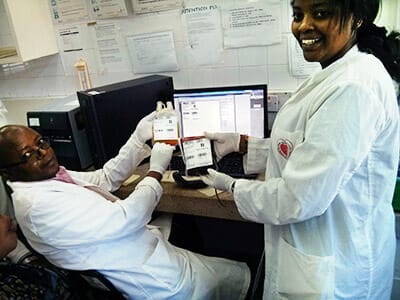News > Blog
Kenya Sets Pace for East Africa by Digitalising Blood Bank Processes
Published 04/01/2015 by Global Communities

Kenya Sets Pace for East Africa by Digitalising Blood Bank Processes
Kenya last month became the first country in East Africa to fully automate it blood bank processes when the Kenya National Blood Transfusion Services (KNBTS) installed the electronic system in its national office and all the Regional Blood Transfusion Centres (RBTCs), covering the entire country. The ePROGESA software solution was specifically designed to meet the functional requirements of blood banks and blood transfusion centers. It enables the blood bank to keep track of blood donors and units of blood available in all its facilities, which ensures the traceability of blood and blood products from collection to distribution. The system also enables interface of the various processes to ensure quality and safety measures right from collection to administration of the blood to needy patients.
Global Communities supported the installation and training of KNBTS staff on the management of the software under the Kenya Blood Safety program (BSP). The five-year program, funded by the U.S. Centers for Disease Control and Prevention (CDC), is coming to a close and has been instrumental in strengthening the capacity of the KNBTS to help ensure a safe and sufficient blood supply in Kenya. The program’s many key contributions include developing guidelines on the establishment blood transfusion facilities. BSP also helped to increase blood collection and testing levels. As a result, the KNBTS is now collecting more blood than it ever has before. Additionally, the program supported KNBTS to become more transparent in its planning and budgetary processes, helping them to develop an asset registry and set goals. The BSP also mapped all of the transfusing hospitals in the country on an interactive country map so that KNBTS can better organize its service and plan for new facility sites; trained engineers on how to repair and maintain their specialized equipment; and advised KNBTS on how to improve service during blood donations.
